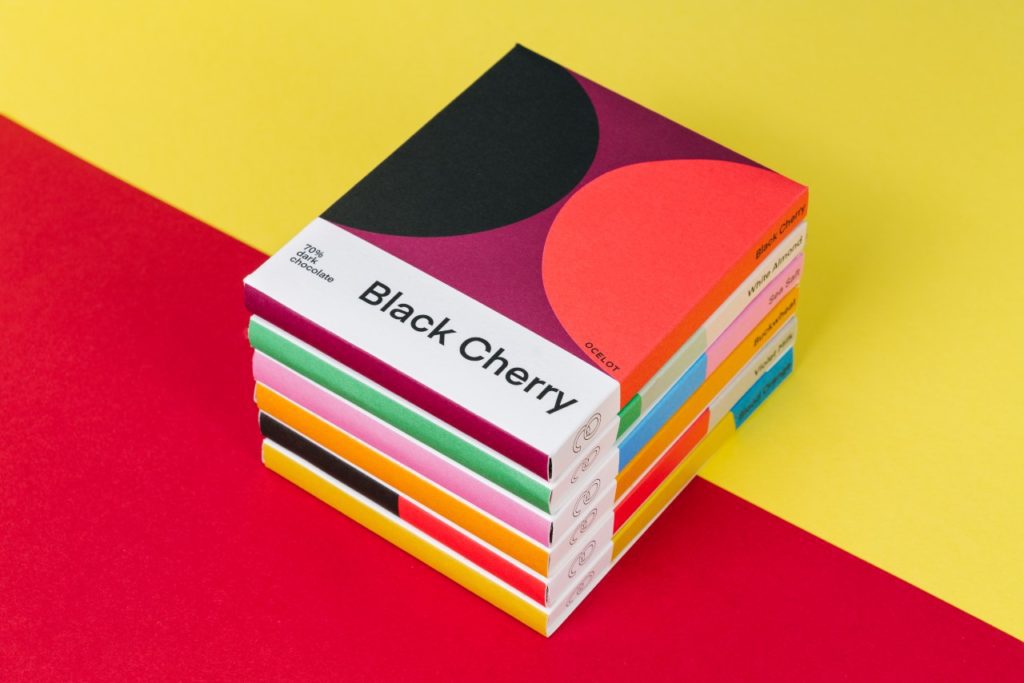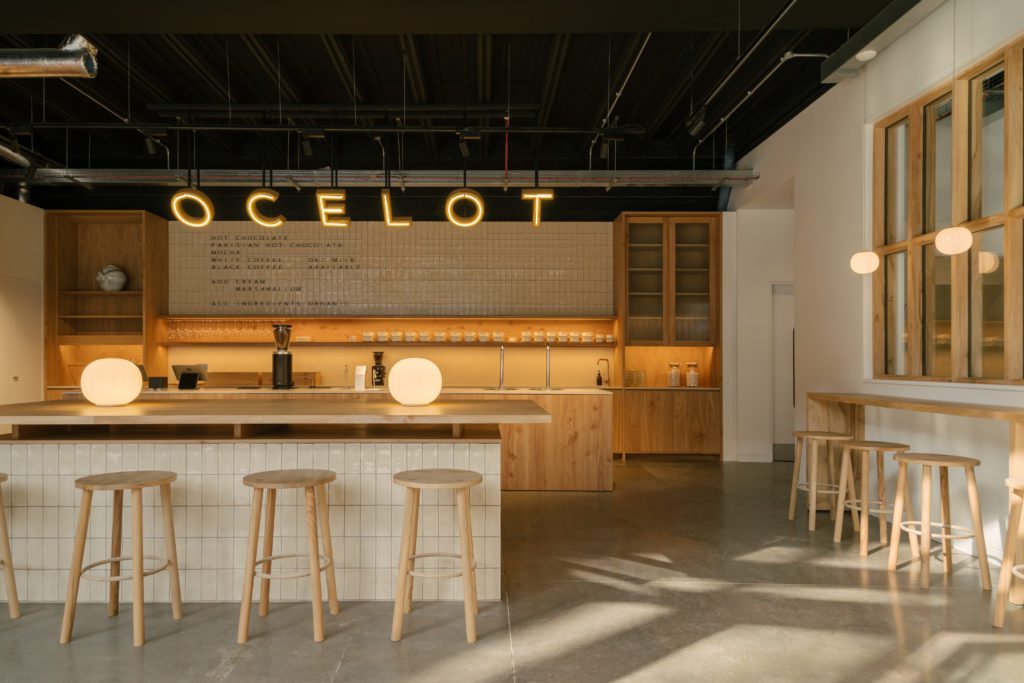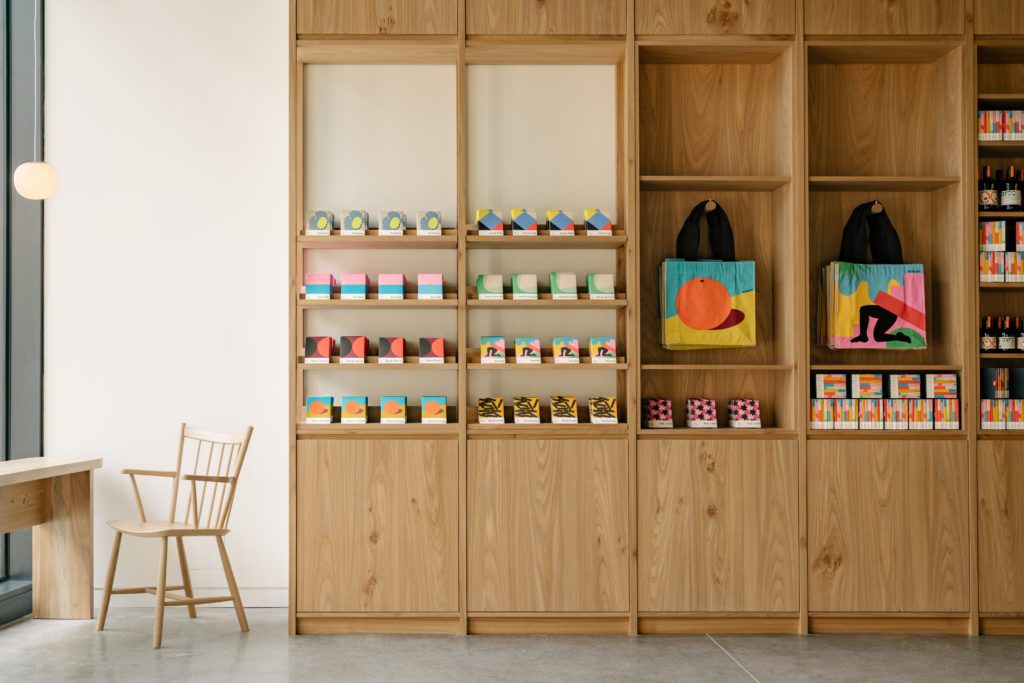Ocelot chocolate started out as the very definition of a kitchen table business.
In 2014, Matthew and Ishbel Broadbent got married, and received some wedding gift money.
Instead of buying crockery from John Lewis, the enterprising Edinburgh-based couple, both originally from Fife, invested in their first trademark and a table-top temperer.
Then they started selling their first chocolate bars at farmers’ markets.
It wasn’t long after they’d created some cool-looking packaging for their new product that Selfridges saw their potential. The London department store wanted to launch and stock their chocolate in store. Since then, the business has continued to grow. These days, Ocelot, named after the spotted wild cat that’s often found on cocoa plantations, sell thousands of bars on a weekly basis and have a team of ten.
Thus, they’ve just moved their headquarters from the outskirts of the city and re-opened on Raeburn Place in Edinburgh’s Stockbridge.
“Our previous factory meant four long bus rides every day for our staff,” says Ishbel, 40. “We wanted to bring it back to the city to increase their quality of life, and to show people what we do in a beautiful environment, befitting of our brand. To us this is probably the most vibrant neighbourhood - it’s such an appealing mix of chi-chi sophistication and bohemian, old-fashioned city life. After six years in windowless industrial units we feel very proud to work on this beautiful tree-lined boulevard, with the sun shining in the windows and sausage dogs trotting by outside”.
Once they’ve received their cocoa roaster, which is en-route and currently somewhere in the middle of the Atlantic, the new factory will start producing chocolate directly from the bean. However, it’s not just a working space. This venue also has its own cafe, which is fitted out with white tiles, native elm cabinets and has their name spelled out in lights behind the counter.
As Ishbel says; “We wanted the space to be generous and uncluttered, the kind of place usually only found in cities like New York and Tokyo”.
There’s a glass wall between this room and the factory, so you can see the magic happening.
The menu currently includes coffee and biodynamic wines by the bottle or glass, as well as cookies, brownies, and locally-sourced pastries with chocolate sauce.
Of course, the organic Parisian hot chocolate is probably what most people will make a pilgrimage to try, even in the warmer months.
“It’s made with our own 70 per cent cocoa chocolate which comes directly out of the melter in front of you,” says Ishbel.
Alongside other merchandise like tote bags, the new space also offers their entire range.
The colourful graphic packaging, which the duo design themselves and is made from compostable film and FSC Certified cardboard, stands out against the neutral backdrop. According to them people often buy their first bar for the box, then make their second purchase for the contents.
They also use their previous experience as cooks in Italy and France to invent the flavours, which are way more interesting and sophisticated than the ubiquitous cookies and cream, or salted caramel. Ocelot offers White Almond, Sea Salt, the seasonal Eggnog, and other intriguing varieties.
“We tried to make a selection based on classic flavours that are well known to complement chocolate - cherry, orange, sea salt, almond - but with a few curveballs, like milk chocolate with toasted buckwheat, “ says Ishbel. “Our best sellers are probably Blood Orange and Femme dark milk chocolate, which is made with rare cocoa beans grown by an all female cooperative in Eastern Congo. Our Violet Milk bar is also a big hit once people try it - even those who think they don’t like violet end up addicted”.

They also do some collaborations with big names, including Mulberry, and make a Pencil chocolate for stationery brand, Present & Correct.
“We used pine and cedar oil to create the flavour, and cocoa nibs for crunch,” says Ishbel.
There’s definitely quite a gulf between what Ocelot produces and, say, a bar of Galaxy or Dairy Milk.
“To us, good quality chocolate is in a food group all of its own and can't be compared to mass produced chocolate: it should be enjoyed more like fine wine or cheese,” says Ishbel. “Our tip for enjoying our chocolate is to firstly make sure your mouth is warm (ie don’t take a drink of something cold right before), place a piece on your tongue and then savour each flavour as it melts”.
Also in contrast to the big brand names, their product is organic, fairly traded and made with minimal ingredients including unrefined sugar, with no added oils or emulsifiers. It also has sustainable credentials. As Ishbel says; “In 2020 our chocolate sales resulted in 98,000 trees planted at origin and 39,000kg of CO2 drawdown”.
They source their beans from Virunga National Park in Eastern Congo, which is a UNESCO World Heritage Site, and the home of the last mountain gorillas.
It seems a long way from there to Edinburgh’s Stockbridge.
For Ishbel and Matthew, there also seems to be metaphorical miles between where they started out and their current location.
“This new factory and cafe has been the biggest project of our lives and it has definitely tested us - to be honest it still hasn’t actually sunk in that we’re open,” says Ishbel. “ When we look at what we have now it seems pretty surreal compared to the tiny table-top temperer and ladle that were our sole equipment only a few years ago. We still have a way to go before it’s all exactly as it should be, but we’re excited for this new chapter in the business. We hope people will enjoy coming on the journey with us”.
122-124 Raeburn Place, www.ocelotchocolate.com


